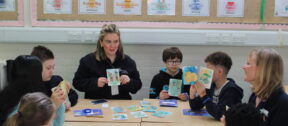Goodnight, sweet dreams!
Are your children getting the right kinds of sleep for wellbeing?
Suffolk Mind are focused on helping people get better sleep, and this includes our children and young people. Lots of children and young people find going to sleep or staying asleep challenging. We all need the right kinds of sleep to make sure we are able to meet our emotional needs to stay mentally well. There are two main kinds of sleep that are needed: Deep sleep, for rest and repair, and REM sleep, to discharge emotional arousal. REM stands for Rapid Eye Movement and is when most of our dreaming happens. We need both types of sleep in the right amounts to be well.
Here are some top tips to encourage good sleep:
Feeling CONTENT
Making sure our bodies are well looked after means that we are also looking after our brains and mental health. Choosing balanced foods and drinks throughout the day can manage the way our brains respond to challenges, but also in the latter part of the day, ensure that we are ready for sleep. Can a small bedtime drink, either a warm drink or water, be part of your bedtime routine? What signals the end of day’s food for your child? Is it fruit after dinner?
Movement throughout the day is vital for good rest. It allows us to burn off cortisol that comes when we feel stressed, and gives us endorphins, which come with feeling good, as well as making sure that the blood is pumping round our bodies, making our heart and lungs work a bit harder so that we are ready for sleep. What other movement could you include in your day? You could try movement that allows for increase in heart rate earlier in the day as well as stretchy calm movement closer to bedtime that will lead the way to a restful sleep.
Making your bedtime routine include elements that set your child up for good sleep are vital for everyone’s restful evenings! Making sure the bedroom is calm and quiet, introducing a predictable and consistent ‘wind down’ routine such as wash, teeth, book, bed can signal to your child that sleep time is coming. Making sleep a happy and safe state to enter into is also important, so whilst it can sometimes be frustrating that children always want to drag out bedtime just that little bit longer, finding the right balance between having firm boundaries and making sure the child feels safe and loved and ready to sleep is worth it for long-term mental health.
Feeling CALM and in CONTROL
After exciting after-school activities or screen time, make time to process thoughts before bedtime. Drawing or Lego can work well. Have choices within your usual routine- would you like to read to me, or shall I read to you tonight? Have boundaries for bedtime routines so children know what to expect- time for being clean, winding down and feeling ready for sleep. Set up predictable patterns that have an element of choice- would you like music or audiobooks to listen to? Would you like calming spray on your pillow or bed cover?
Feeling CONNECTED
Bedtime is often the time which children decided to process their day, and you may find that this is the time that they ask lots of questions or have lots to say, just as you are about to turn off the light. If your child is in need of this talk time, schedule it in for earlier in the routine. Can you have a chat whilst getting clothes ready for the next day or in the bath? Take time to talk about your day, read or tell stories together, nurture the secure relationship so that sleep feels safe and happy. Your child will also meet their need for emotional connection and attention through this exchange and be more ready to fall asleep when it is time.
Feeling that I CAN
Involve your child in making their bedtime routine. What is it that makes them feel safe and secure? What things can they do independently, and which do they need or want some help with to feel settled? Do they understand why going to sleep at the right time is important? Can they draw or make a ticklist of their bedtime routine that can be used every day so that they have a predictable and consistent way of being independent?
Written by Louise Harris, Children and Young People’s Lead















